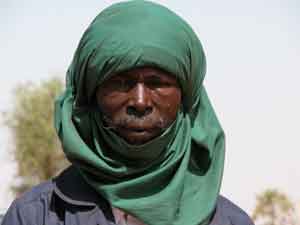|
|
Niger: Free Food Needed Now As Millions Teeter On the Brink of Famine, UN Says
AllAfrica.com
Niger
July 14, 2005

Free food must be handed out immediately to children, pregnant women and the elderly in Niger or the serious food crisis in the West African country will tip into full-scale famine, a top UN official said on Thursday.
"Now that the situation has become more acute and there are people who cannot even afford 250 CFA (46 US cents) to buy a cup of millet, we need to step up a gear and have free food distributions," Jean Ziegler, the UN Special Rapporteur on the Right to Food, told IRIN at the end of a five-day visit to Niger.
Last year, the vast semi-arid nation suffered the worst drought in recent memory as well as a crop-destroying invasion of locusts. Now granaries lie empty, market prices are sky-rocketing and every day malnourished children are dying.
"Some 3.6 million people, including 800,000 children, are facing acute malnutrition, which at any moment could turn into a famine," said Ziegler, a Swiss sociologist.
"We have asked the government to immediately begin the free distribution of food to vulnerable groups to ensure their survival," he said by telephone shortly after returning to his base in Geneva.
The government in Niamey has so far chosen to subsidise grain sales in the hardest-hit areas and has resisted large-scale free food handouts for fear that they might encourage dependency on aid and distort local markets.
However Ziegler said the authorities had now accepted the need for a change in tactics.
Earlier this week, the UN World Food Programme announced plans to triple the number of people getting free food aid to 1.2 million, as the food crisis tightened its grip. It appealed to donors for US $12 million to fund this expanded distribution programme.
Niger is a semi-desert nation on the southern fringe of the Sahara, which according to the UN Human Development Index is the second poorest country in the world.
Ziegler explained that the country had been divided into 106 surveillance zones, but only 19 of these zones enjoyed a satisfactory food situation.
"In all other zones, the situation is either critical or extremely critical," he said.
"In some pockets of famine, vulnerable persons, in particular children under five, are already dying."
The international medical charity Medecins Sans Frontieres (MSF) says it is treating three times as many malnourished children in Niger as last year.
As men flee to urban centres, their women lie listless at home, too weak to work the fields despite the recent onset of the rainy season, and their children wither to skin and bones.
Ziegler said the response of the international community to this tragedy had been totally inadequate.
"It's scandalous. We have received less than a quarter of the funding we asked for," he said.
In May, the UN Office for the Coordination of Humanitarian Affairs (OCHA) launched a flash appeal for just over US $16 million. The appeal was subsequently raised to $18 million.
But only $3.8 million has been received to date.
The Niger government says its food stocks have been long since exhausted, so with an estimated food deficit of 223,000 tonnes this year, the country is relying more than ever on help from outside.
"Responding to this flash appeal is not about charity, it's about obligations under international law," Ziegler said. "When a UN member state is having difficulty nourishing its people, the other member states have a legal duty to act."
|
|



